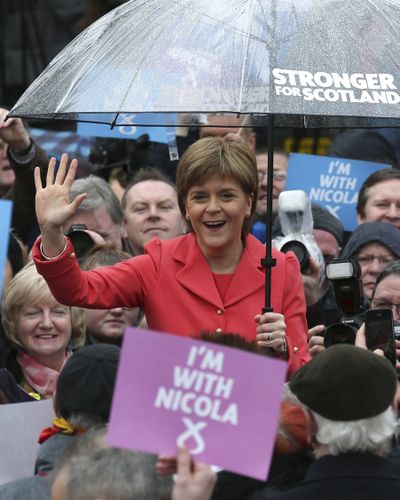Rise of Scottish National Party transforms U.K. elections

EDINBURGH, Scotland – When Britain’s national elections are held today, there’s a solid chance John Alexander will opt for the Scottish National Party, the group that led September’s failed separatist campaign, even though he favors unity.
Alexander, an energy-industry employee from Glasgow, says he has not been impressed with Britain’s major political parties.
“Both Labor and the Conservatives have really squandered opportunities in Scotland after the vote,” said Alexander, 54, who was at an Edinburgh park with his wife and teenage son on a day trip this week. “The SNP has become a very viable alternative.”
To the surprise of many analysts, voters like Alexander have fled Labor and flocked to the SNP in recent months. Once thought doomed, the SNP – fiscally liberal but fiercely nationalist – has surged under new leader Nicola Sturgeon. It is now expected to octuple its number of seats in the House of Commons, from six to more than 50.
The group’s rise has transformed the British election. Neither David Cameron’s Conservative Party nor Ed Miliband’s Labor Party are forecast to garner much more than one-third of the 650 seats today, meaning political leaders will need to form a coalition among parties to run the country.
That leaves Sturgeon as an unlikely kingmaker, and puts the nation’s future in the hands of voters long considered an afterthought in British politics.
“I don’t believe anyone thought this is the position we’d be in,” said Michael Keating, a political science professor at the University of Aberdeen. “Usually Labor (in Scotland) comes back when there’s a U.K. election.”
This British election is considered among the most important in decades. At stake are austerity policies, health care funding and other domestic issues. But there also are more global matters at hand, including Britain’s relationship with the United States and the European Union. Cameron, for instance, has said he will push for a referendum on EU membership if re-elected, even over the objections of coalition partners. Labor wants Britain to remain in the EU.
The drama will almost certainly not be over when polls close. A so-called hung Parliament, the most likely occurrence, would leave Laborites and Tories scrambling to court smaller parties for a coalition. And that’s where the SNP comes in.
Sturgeon has said she would not join the Tories but would work with Labor. For his part, Miliband, to avoid alienating voters, has made campaign pledges that he won’t negotiate with the SNP. A reversal could spark a backlash, and even if he pulled it off, could cause legislative logjams later on issues such as education and welfare, on which Scottish and English voters tend to split.
Miliband could try to forge a coalition without the Scottish nationalists, a difficult maneuver that, even if successful, could drive Scotland further down the road to independence.
Cameron, meanwhile, has used the SNP as a wedge issue. In stump speeches and media appearances, he has wooed voters with the refrain that a Labor victory would put Scottish separatists into power.
Sturgeon has capitalized on voter discontent with articulate and direct responses that push more liberal economic policies and play on a sense that the SNP is the only party that cares for Scottish citizens. Her emergence has stoked passions throughout the United Kingdom.
Newspapers and magazines have been sounding alarm bells over the SNP’s rise. The Economist wrote last week that the party “spells grave danger for the United Kingdom.”